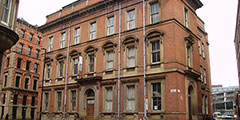“Education is, quite simply, peace-building by another name. It is the most effective form of defence spending there is.”
– Kofi Annan
The Institute building, completed in 1854, is now a conference centre. It began life as the Mechanics Institute, a school for working people. Its history reflects changes in thinking about education, workers’ rights and social responsibility.
The Institute was first founded in 1825 to offer education to young working men. Like many charitable associations of its time, the Institute was funded by wealthy citizens influenced by the radical ideas being discussed in Manchester’s political and philosophical societies and meetings. But working class people still had little say in how these new institutions worked.
The original Institute, including a library, was built in in Cooper Street. Workmen, ranging from shopkeepers to labourers, could attended evening classes in writing, reading, arithmetic, languages and music. However, classes were not free: the poorest people in the city were still excluded. In 1837, women were allowed to attend the Institute, but classes offered to them – household management and craft – show that ideas about education for all were still very limited. The Institute also ran a children’s school, when there was no state education or other affordable schooling for Manchester’s working class families.
The Institute attracted well known speakers and was very successful. By 1854 it needed new, larger premises: this new Institute was built on Princess Street in what is known as the palazzo style, like many of the buildings in this area.
In 1870 children’s education was made compulsory. More education opportunities for working adults became available. The Institute changed over the years, becoming a Technical School, a teacher training college and finally the Municipal High School of Commerce. After this closed in the 1960s the building, unused and unrepaired, came close to collapse. A Trust was set up to restore the Institute, which re-opened as a Trades Union meeting centre.
The Institute has hosted key events in social and political history including the first mass meeting, or congress, of trades unions in 1864. This is now known, famously, as the Trades Union Congress or TUC. The Cooperative Insurance Society was also founded at this site. Plaques on the Institute’s walls recall these historic events, as they reflect major developments in social history.






 2 minutes
2 minutes